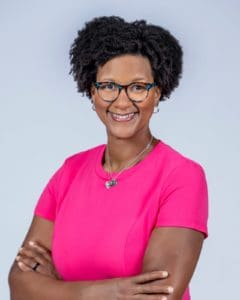Turn Down Talking, Turn Up Listening. Member Spotlight: Bianca Motley Broom
Bianca Motley Broom is Mayor of the city of College Park, Georgia, as well as a mediator and arbitrator at Miles Mediation and Arbitration Services. She’s had over fifteen years of legal practice, formerly serving as a part-time judge in the Magistrate Court of Fulton County, Georgia. Bianca received her J.D. from Washington University in St. Louis School of Law, her M.B.A from Lake Forest Graduate School of Management, and her B.A. in Public Policy Studies and Religion from Duke University.
MBBI Involvement

Bianca has been a member of MBBI for several years and has engaged significantly with the network in the past year. With the sociopolitical crises and widespread anxiety that defined 2020 and carried through to 2021, MBBI provided Bianca an outlet to connect with international experts who helped her think about conflict resolution in a broader context. She recalls a conversation she had with other MBBI colleagues around the 2020 presidential election in the United States and how the January 6 attack on the U.S. Capitol was a manifestation of people feeling unheard. This discussion helped reinforce her understanding that mediators are uniquely equipped to be the people who will listen in their own communities. “I think when people, no matter who they are and no matter where they are, are heard, acknowledged, and respected, we have a lesser likelihood that things devolve into violence and destruction.”
Leading the Way as Mayor and Mediator
The skills Bianca has developed as a mediator play a large role in her responsibilities as Mayor of College Park. She focuses on listening with an open heart and open mind, recognizing that the collective can get closer to good solutions when all parties bring together different viewpoints. She describes it as a downshift, where she “turns down talking and turns up listening.” When we do this, we discover more about ourselves, others, and the situation as a whole so that everyone benefits. This lesson was put into practice in the community conversations she oversaw as Mayor after George Floyd was killed. The city is now in the midst of hiring a new police chief, while also learning lessons about their core principles of equity and inclusion in order to find the right person to serve College Park. “I think it takes the entire community. We don’t always get it right, so it takes a conscious effort to engage everyone and get that level of collaboration.”
Bianca is a trailblazer in her own right as the first woman and of the first person of color elected Mayor of College Park, Georgia. “My city is majority African American. Being a woman is much more of an ‘issue’,” she adds. She has felt some pushback from individuals who are less accepting of female leadership, but she continues to pave the way for greater representation of diverse leaders while tackling complex issues that other small cities this size rarely have to face. In the legal field as well, she acknowledges how patriarchal it can be. “I wish that we were in a place where we could be evaluated for what we bring to the table instead of what we look like. I’ve been on the attorney side of mediating and not felt like I was heard because I was a woman, or because I didn’t know football and couldn’t get to know the guys on that level.” She pauses and with a wry smile adds, “but I actually really do know a ton about football.”
Paths to Peace
Despite these challenges, Bianca continues her work as a mediator out of sincere love for people. In comparison to her experiences in the traditional litigation process, she finds that conflict resolution is far more fulfilling to her in many different ways. “I’ve gotten more hugs as a mediator than I have as a litigator!” She firmly believes that most of us have more in common than we differ; all we have to do is try to make those connections with others. “We don’t have to have the same experiences to understand each other. I know fear, I know sorrow, we’ve all suffered from grief. There are things that are universal about the human experience that a good mediator draws upon to help parties get to where they need to be.” Oftentimes, we just need to take the first step to build rapport with someone else and have a natural curiosity about people. “Sometimes, it’s ‘I do pottery.’ If I find a fellow potter, we can talk all day long. Or, we can talk about my love for Costco. It’s very intense.” She admits that these topics can sound trivial, but throughout her career, she’s endeavored to make people feel comfortable and at ease, particularly when having to mediate tense conflicts.
As Bianca looks forward to the future of the mediation field, she is hopeful about new programs that educate youth on conflict resolution methods that they can utilize in their daily lives. In communities she has engaged in, children may grow up without seeing examples of how to effectively and healthily resolve conflict without resorting to violence. Some face patterns of violence in their own homes, they face traumas that impact their humanity and affect development. To counteract these challenges, she says that schools should place an emphasis on conflict resolution to equip students with the tools that are needed to handle disputes, “beyond a knife, a gun, a fist,” and support a new, more peaceful generation.
Article by Chloe Pan, MBBI Writer
